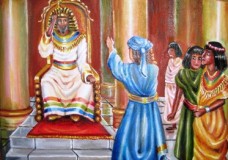Banjul :18:33-19:26, Bamako: 18:00-18:53, Dakar :18:34-19:28, Masvingo 18:22-19:17,
Kinshasa : 17:55-18:48, Abuja : 18:04-18:57, Lagos : 18:25-19:18, Enugu : 18:09-19:01,
Abia : 18:11-19:04, Delta : 18:12-19:05, Anambra :18:11-19:04, Imo : 18:12-19:05,
Harare : 18:17-19:12, Yaoundé : 17:57-18:50, Antananarivo : 18:13-19:08, Accra : 17:41-18:34
 Parashat Vayigash (Genesis 44:18 – 47:27)
Parashat Vayigash (Genesis 44:18 – 47:27)
Joseph makes himself known to his brothers. After the dramatic revelation and its reverberations throughout Pharaoh’s palace, the next mission is to transmit this far from simple message to his elderly father Jacob in a way that he would be able to take. Indeed, according to the midrash, Serah daughter of Asher took it upon herself to relay the message in a delicate, poetic way (Midrash Ha-Gadol, Va-Yigash, 45.26).
After Jacob digested the fact that “Joseph is still alive,” the divine spark in him revived, and when he had the good fortune to see the face of his beloved son Joseph, and realized that he was not only alive on the physical level but also on the spiritual-religious level, he ostensibly expressed the wish to die, saying, “Let me die now, having seen your face, that you are still alive” (Gen. 46:30). Now we must ask what he meant by this wish? Should we take it as something Jacob wanted to happen? As if he were asking to die? Onkelos translates this verse as follows: “If I were to die this time, I would have consolation, for I have seen your face, seen that you are still alive.”
The midrash relates to this statement on a different, deeper level (Tanhuma, Va-Yigash 9):
Why did he say, “Let me die this time”? He said, “When my children came to me and said that Joseph is dead, I used to say that I would die twice. Now that I have seen you are alive, I have tidings that I will only die now!” Therefore he said, “This time I will die.”
According to this homiletical interpretation, we do not have a wish to die expressed here, rather an expression of the situation having turned for the better, an evil curtailed, as if to say: I was supposed to die twice, in this world and in the world to come; but now I will only die this time, once, in this world, as is the way of all flesh, and no more. My life in the world to come is assured me because I have fulfilled my destiny here.
